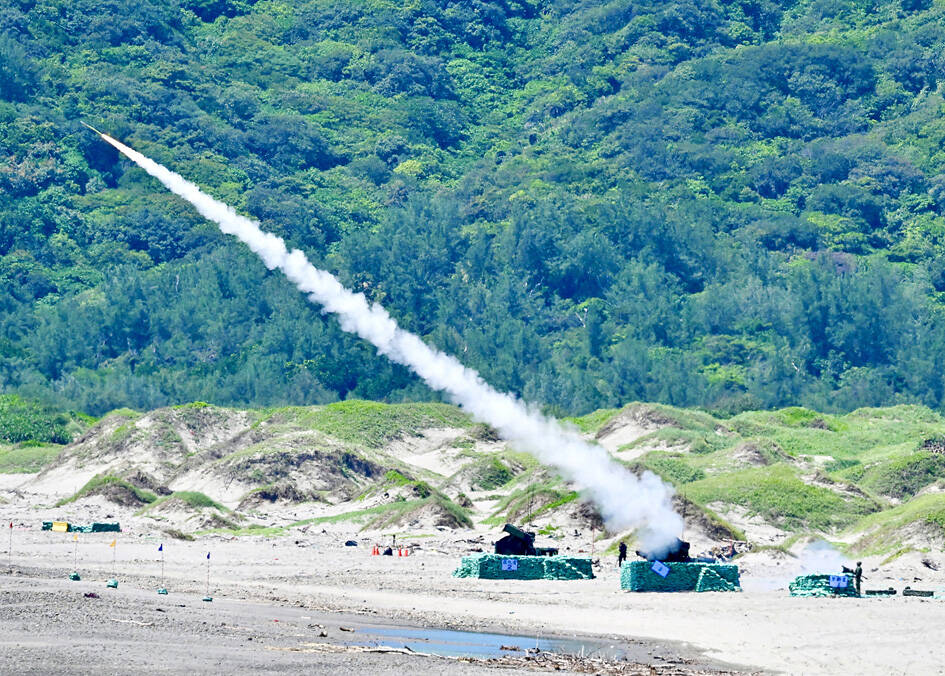Part of a package of man-portable air-defense (MANPAD) Stinger missile systems was delivered to Taiwan last year, sources familiar with the issue said yesterday.
Capital defense units, such as the Military Police, the Marine Corps and the army’s special forces units, were prioritized to receive the weapons, which were authorized by the US’ National Defense Authorization Act (NDAA) to boost Taiwan’s self-defense capabilities, the sources said.
The NDAA for the last fiscal year included provisions to provide US$10 billion in grants — US$2 billion over the next five years — for Taiwan to buy US-made weapons.

Photo: Lo Pei-te, Taipei Times
The NDAA also paved the way for 1,000 M240B machine guns, 8,000 sets of combat gear, tethered aerostat radar systems and coastal surface-to-air Harpoon missile systems, the sources said.
While news media have reported that Washington might provide Taiwan with four MQ-9A Reaper drones, the drones need to be paired with real-time ground stations to be 100 percent functional, the sources added.
The M240B guns have a broader range of uses, including on helicopters, combat vehicles, tanks and small boats, they said, adding that Taiwan procured the weapon for use across the military and for the Coast Guard Administration.
The navy has budgeted NT$13.37 billion (US$427.94 million) to purchase 500 additional Stinger missiles, half of which would go to the army and the other half to the Marine Corps or naval vessels, the sources said.
The second batch is expected to be delivered later this year, they said.
A Ministry of National Defense budget showed that Army Command Headquarters has set aside NT$7.26 billion, covering 2019 to next year, for 250 Stinger missiles, 108 gripstock-control groups — which attach to a shoulder-fired guided missile launch tube — and 108 Identification Friend or Foe (IFF) transponders.
Navy Command Headquarters has allotted NT$6.19 billion from 2017 to next year for 250 Stinger missiles, 70 gripstock-control groups and 62 IFF systems.
Department of Strategic Planning director Lee Shih-chiang (李世強) in October last year said that the grip controls for the MANPADs are capable of loading Avenger missiles and missiles used for dual-mounted Stinger systems.
The army ordered the extra grip controls for tactical flexibility, Lee said.

MORE VISITORS: The Tourism Administration said that it is seeing positive prospects in its efforts to expand the tourism market in North America and Europe Taiwan has been ranked as the cheapest place in the world to travel to this year, based on a list recommended by NerdWallet. The San Francisco-based personal finance company said that Taiwan topped the list of 16 nations it chose for budget travelers because US tourists do not need visas and travelers can easily have a good meal for less than US$10. A bus ride in Taipei costs just under US$0.50, while subway rides start at US$0.60, the firm said, adding that public transportation in Taiwan is easy to navigate. The firm also called Taiwan a “food lover’s paradise,” citing inexpensive breakfast stalls

TRADE: A mandatory declaration of origin for manufactured goods bound for the US is to take effect on May 7 to block China from exploiting Taiwan’s trade channels All products manufactured in Taiwan and exported to the US must include a signed declaration of origin starting on May 7, the Bureau of Foreign Trade announced yesterday. US President Donald Trump on April 2 imposed a 32 percent tariff on imports from Taiwan, but one week later announced a 90-day pause on its implementation. However, a universal 10 percent tariff was immediately applied to most imports from around the world. On April 12, the Trump administration further exempted computers, smartphones and semiconductors from the new tariffs. In response, President William Lai’s (賴清德) administration has introduced a series of countermeasures to support affected

CROSS-STRAIT: The vast majority of Taiwanese support maintaining the ‘status quo,’ while concern is rising about Beijing’s influence operations More than eight out of 10 Taiwanese reject Beijing’s “one country, two systems” framework for cross-strait relations, according to a survey released by the Mainland Affairs Council (MAC) on Thursday. The MAC’s latest quarterly survey found that 84.4 percent of respondents opposed Beijing’s “one country, two systems” formula for handling cross-strait relations — a figure consistent with past polling. Over the past three years, opposition to the framework has remained high, ranging from a low of 83.6 percent in April 2023 to a peak of 89.6 percent in April last year. In the most recent poll, 82.5 percent also rejected China’s

PLUGGING HOLES: The amendments would bring the legislation in line with systems found in other countries such as Japan and the US, Legislator Chen Kuan-ting said Democratic Progressive Party (DPP) Legislator Chen Kuan-ting (陳冠廷) has proposed amending national security legislation amid a spate of espionage cases. Potential gaps in security vetting procedures for personnel with access to sensitive information prompted him to propose the amendments, which would introduce changes to Article 14 of the Classified National Security Information Protection Act (國家機密保護法), Chen said yesterday. The proposal, which aims to enhance interagency vetting procedures and reduce the risk of classified information leaks, would establish a comprehensive security clearance system in Taiwan, he said. The amendment would require character and loyalty checks for civil servants and intelligence personnel prior to